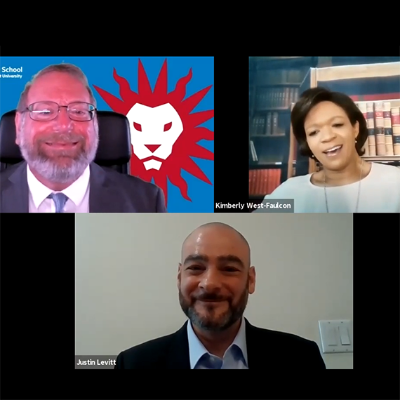LLS’ Legal Lunch Bites Series Addresses Issues Around Pandemic
LLS’ Legal Lunch Bites Series Addresses Issues Around Pandemic

“One of the things you take away from law school is that we do not have a U.S. Constitution that protects positive rights,” said Professor Kimberly West-Faulcon during the recent debut session of Legal Lunch Bites, a summer series featuring LMU Loyola Law School faculty discussing legal issues related to COVID-19. “Those who have the privilege of attending law school and taking constitutional law know that you do not have any absolute rights at all under the constitution.”
The session, COVID-19 & the Constitution, explored the ways that the law has and has not responded to the COVID-19 pandemic, and the way that the law channels public and private action in pandemic circumstances. West-Faulcon, James P. Bradley Chair in Constitutional Law, was joined by Professor Aaron Caplan in the panel moderated by Professor Justin Levitt.
“All of the stay-at-home, close-businesses and lockdown orders are coming from state and local governments right now. So we’ll focus on that,” said Caplan. “Our starting point for state and local governments is that they can do anything that they think is a good idea unless there’s something specific telling them that they can’t. We often refer to this as police power: the power of the state government to do things that are good for the health and safety of their citizens.”
Subsequent Legal Lunch Bites sessions are addressing a swath of other legal issues related to the pandemic. The June 3 Criminal and Juvenile Justice panel featured a discussion between Professor Samantha Buckingham, director of LLS’ Juvenile Justice Clinic, and Sean Kennedy, Kaplan & Feldman Executive Director of the Center for Juvenile Law & Policy, that focused on the safety dangers presented by the pandemic to juvenile defendants and they're advocates.
The session started by confronting the real-life issues faced by LLS clinical attorneys in helping their clients. "For those of us who are working with kids in the juvenile justice system and operating as their defense attorneys, our No. 1 goal is to advocate for the release of our clients from detention," said Buckingham. “If we get our clients out and released….they are not going to have as many collateral consequences of being detained during the coronavirus.”
One part of the discussion focused on concerns for those in custody. “It would be a great hope that, as a result of what what's happened here and what continues to happen, that we realize, as a society we don't need to detain the number of people we've been detaining,” said Buckingham.
Elsewhere, the panelists addressed issues of fairness presented by alternative methods of conducting hearings. "Are you going to cross-examine someone in a mask? And is that going to meet the right to confront and cross-examine witnesses? I have real reservations about whether it does," said Kennedy. "These questions about how to deal with the constitutional problems that collide with the safeguards required during the pandemic deserve to be raised."
Others sessions in the series are addressing a range of other legal issues:
- June 9: Artificial Intelligence Tools in the Fight Against COVID-19 featuring Professors Jeffery Atik and Karl Manheim, who teach the AI & the Law. The discussion will look at how actors have engaged AI in the fight against COVID-19, including AI in vaccine development and contact tracing, and some of the privacy implications of that deployment.
- June 11: COVID-19 & Contracts featuring Professors Robert Brain, Victor Gold and Bryan Hull. The discussion will focus on the ways that COVID-19 has impacted contracts, including force majeure provisions and doctrine regarding impracticability and frustration of purpose.
- June 16: COVID-19 & the Election Process featuring Professors Jessica Levinson, Justin Levitt & John Nockleby. The panel will look at the primaries impacted by COVID-19, and what they indicate for the elections ahead, including concerns about funding, voting by mail, the availability of in-person locations, and continuing interference from abroad.
- June 18: COVID-19 & Immunity from Liability featuring Professors John Nockleby and Adam Zimmerman. The panel will explore tort liability in a pandemic age, and some of the proposals to limit or channel liability in the event of harm.
- June 25: COVID-19 & Immigration featuring Professor Kathleen Kim and Adjunct Professor Victor Nieblas. The session will examine COVID-19 in the immigration context, including new restrictions on immigration, human rights concerns, and safety concerns in detention.